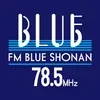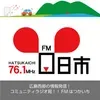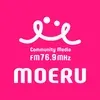Enka Live Radio Stations
Radio Stations
- 84.3 FM Edogawa (FMえどがわ, JOZZ3AS-FM, Edogawa City, Tokyo)

- Come On! FM (カモンエフエム, JOZZ8AE-FM, 76.4 MHz, Shimonoseki, Yamaguchi)

- Dreams FM (ドリームスエフエム, JOZZ0AI-FM, 76.5 MHz, Kurume, Fukuoka)

- FM 791 (熊本シティエフエム, JOZZ0AB-FM, 79.1 MHz, Chuo-ku, Kumamoto City)

- FM Blue Shonan (FM・ブルー湘南 , JOZZ3AD-FM, 78.5 MHz, Yokosuka, Kanagawa)

- FM Chu Pea (FMちゅーピー, JOZZ8AG-FM, 76.6 MHz, Chuo-ku, Hiroshima)

- FM Fujiyama (FMふじやま, JOZZ3CA-FM, 77.6 MHz, Fujikawaguchiko, Yamanashi)FM Fujiyama (FMふじやま, JOZZ3CA-FM, 77.6 MHz, Fujikaw...
- FM Gaiya (FMがいや, JOZZ9AI-FM, 76.9 MHz, Uwajima, Ehime)

- FM Gojō (FM五條, JOZZ7BP-FM, 78.0 MHz, Gojō, Nara)FM Gojō (FM五條, JOZZ7BP-FM, 78.0 MHz, Gojō, Nara)
- FM Hana (FMはな, JOZZ1AZ-FM, 87.0 MHz, Nakashibetsu, Hokkaido)

- FM Hanako (JOZZ7AA-FM, 82.4 MHz, Moriguchi City, Osaka)

- FM Hatsukaichi (エフエムはつかいち, JOZZ8AP-FM, 76.1 MHz, Hatsukaichi, Hiroshima)

- FM Higashi (FM東広島, JOZZ8AU-FM, 89.7 MHz, Higashihiroshima, Hiroshima)

- FM Kahoku 78.7 (FMかほく, JOZZ5AM-FM, 78.7 MHz, Kahoku City, Ishikawa)

- FM Karatsu (からつエフエム, JOZZ0BN-FM, 86.8 MHz, Karatsu, Saga)FM Karatsu (からつエフエム, JOZZ0BN-FM, 86.8 MHz, Karatsu...
- FM Kashima (FMかしま, JOZZ3BD-FM, 76.7 MHz, Kashima, Ibaraki)

- FM Kurashiki (FMくらしき, JOZZ8AC-FM, 82.8 MHz, Kurashiki, Okayama)

- FM Moeru (エフエムもえる, JOZZ1AR-FM, 76.9 MHz, Rumoi, Hokkaido)

- FM Onomichi (エフエムおのみち79.4, JOZZ8AF-FM, 79.4 MHz, Onomichi, Hiroshima)

- FM Radio BariBari (FMラヂオバリバリ, JOZZ9AH-FM, 78.9 MHz, Imabari, Ehime)

- FM Yame (FM八女, JOZZ0BY-FM, 80.1 MHz, Yame, Fukuoka)

- FMふくろう ( ふくろうエフエム, JOZZ3CH-FM, 85.8 MHz, Yachiyo, Chiba)

- Fujisan GOGO FM 86.3 (富士山GOGOエフエム, JOZZ6BF-FM, 86.3 MHz, Gotemba, Shizuoka)

- Happy FM Itami (ハッピーエフエムいたみ, JOZZ7AJ-FM, 79.4 MHz, Itami, Hyōgo)

- Humming FM Takarazuka (ハミングFM宝塚, JOZZ7AT-FM, 83.5 MHz, Takarazuka, Hyōgo)

- Ichikawa Urara FM (市川うららFM. JOZZ3AY-FM, 83.0 MHz, Ichikawa, Chiba)Ichikawa Urara FM (市川うららFM. JOZZ3AY-FM, 83.0 MHz, ...
- Kappa FM (かっぱFM, JOZZ0AE-FM, 76.5 MHz, Yatsushiro, Kumamoto)

- Kyoto Living FM (京都リビング FM/きょうと りびんぐ FM)

- NOAS FM (エフエムなかつ, JOZZ0AX-FM, 78.9 MHz, Nakatsu, Oita)NOAS FM (エフエムなかつ, JOZZ0AX-FM, 78.9 MHz, Nakatsu, O...
- Oranda Radio (エフエムい~じゃん おらんだラジオ, JOZZ2BK-FM, 77.7 MHz, Nagai, Yamagata)

- Radio Monster FM76.2 (ラジオモンスター, JOZZ2AA-FM, 76.2 MHz, Yamagata City)

- Sakura FM (さくらFM, JOZZ7AN-FM, 78.7 MHz, Nishinomiya, Hyōgo)

- Shonan Magic Wave (湘南マジックウェィブ, JOZZ3CI-FM, 85.6 MHz, Ōiso, Kanagawa)

- Shuunan FM (しゅうなんFM, JOZZ8AJ-FM, 78.4 MHz, Shūnan, Yamaguchi)

- Umeda FM Be Happy! (ウメダFM Be Happy! 789/エフエムキタ, JOZZ7AK-FM, 78.9MHz, Kita-ku, Osaka)

- Yufuin Radio (ゆふいんラヂオ局, JOZZ0BU-FM, 87.4 MHz, Yufu, Oita)

Choose a Genre
Enka: The Soulful Japanese Ballad That Resonates Across Generations
Enka, often referred to as the "Japanese ballad," is a timeless genre of music that has captured the hearts of audiences in Japan and beyond. With its melancholic melodies, emotional vocal delivery, and deep connection to traditional Japanese culture, enka has remained a beloved genre despite the passage of time. Its roots in early 20th-century Japan have allowed it to evolve while preserving its nostalgic and sentimental essence, making it a genre that speaks to the soul.
The Heart of Enka: A Deep Emotional Connection
At the core of enka is its ability to evoke deep emotions. The music is characterized by its mournful, yet beautiful, melodies that often tell stories of love, loss, longing, and nostalgia. The lyrics, typically delivered in a highly expressive and emotional style, speak of personal struggles and the passage of time, making it relatable to listeners across generations.
The singing style in enka is unique, often described as "sobbing" or "crying," due to the intense use of vibrato and a dramatic, almost theatrical vocal approach. This style allows singers to convey a raw emotional intensity that connects with the listener on a visceral level. The songs, often performed with deep sentiment, provide an outlet for expressions of sorrow and longing, resonating with those familiar with the themes of heartbreak and remembrance.
The Musical Accompaniment: Traditional Instruments and Orchestra
Enka performances are typically accompanied by traditional Japanese instruments, which add to the genre's unique sound. Among the key instruments are:
Shamisen: A three-stringed instrument, played with a plectrum, that provides a distinctive sound in enka music.
Taiko Drums: These powerful drums add a rhythmic and dramatic element to the music, enhancing the emotional tone of the performance.
Koto: A stringed instrument with 13 strings, known for its delicate sound that complements the passionate vocals of the singer.
These traditional instruments create a rich, evocative soundscape that mirrors the emotive quality of the lyrics and vocal delivery. Together, they form a distinct musical style that is deeply rooted in Japan's cultural heritage.
The Golden Age of Enka: The 1960s and 1970s
Enka's popularity reached its peak during the 1960s and 1970s, when it was the soundtrack to many of Japan's most important cultural moments. During this time, legendary singers such as Hibari Misora, Saburo Kitajima, and Yuzo Kayama became household names, with their powerful performances contributing to the genre's dominance on Japanese radio and television.
Despite its golden age, enka never truly faded away. While the genre's prominence waned in favor of newer musical styles, it retained a loyal following, particularly among older generations who cherished its nostalgic and reflective qualities. The enduring popularity of enka speaks to its timeless appeal, as it continues to connect deeply with audiences who value its emotional depth.
Enka Today: A Genre with Global Appeal
While enka is undeniably a genre rooted in traditional Japanese culture, it has also gained recognition outside of Japan. In countries with large Japanese populations, such as the United States and Brazil, enka has found an audience eager to embrace its emotional storytelling and heartfelt melodies.
On Japanese radio, enka continues to be a staple, especially on stations that specialize in traditional music. The genre is often featured during evening programs or on special broadcasts dedicated to honoring the cultural legacy of Japan. For fans of enka, these radio stations are an important part of keeping the genre alive and accessible to new listeners.
The Legacy of Enka: An Enduring Art Form
Enka stands as a testament to the enduring power of music to evoke emotion and preserve cultural identity. While many musical genres may come and go, enka remains a beloved and enduring art form, its themes of love, loss, and nostalgia continuing to resonate with new generations of listeners.
Despite being over a century old, enka remains a cornerstone of Japanese music and culture. Its legacy is carried forward by new performers who blend the traditional style with contemporary influences, ensuring that enka will continue to inspire audiences for years to come. Whether you're listening to a classic enka hit or discovering newer artists in the genre, enka offers a unique and deeply emotional musical experience that transcends time and borders.
Enka, often referred to as the "Japanese ballad," is a timeless genre of music that has captured the hearts of audiences in Japan and beyond. With its melancholic melodies, emotional vocal delivery, and deep connection to traditional Japanese culture, enka has remained a beloved genre despite the passage of time. Its roots in early 20th-century Japan have allowed it to evolve while preserving its nostalgic and sentimental essence, making it a genre that speaks to the soul.
The Heart of Enka: A Deep Emotional Connection
At the core of enka is its ability to evoke deep emotions. The music is characterized by its mournful, yet beautiful, melodies that often tell stories of love, loss, longing, and nostalgia. The lyrics, typically delivered in a highly expressive and emotional style, speak of personal struggles and the passage of time, making it relatable to listeners across generations.
The singing style in enka is unique, often described as "sobbing" or "crying," due to the intense use of vibrato and a dramatic, almost theatrical vocal approach. This style allows singers to convey a raw emotional intensity that connects with the listener on a visceral level. The songs, often performed with deep sentiment, provide an outlet for expressions of sorrow and longing, resonating with those familiar with the themes of heartbreak and remembrance.
The Musical Accompaniment: Traditional Instruments and Orchestra
Enka performances are typically accompanied by traditional Japanese instruments, which add to the genre's unique sound. Among the key instruments are:
Shamisen: A three-stringed instrument, played with a plectrum, that provides a distinctive sound in enka music.
Taiko Drums: These powerful drums add a rhythmic and dramatic element to the music, enhancing the emotional tone of the performance.
Koto: A stringed instrument with 13 strings, known for its delicate sound that complements the passionate vocals of the singer.
These traditional instruments create a rich, evocative soundscape that mirrors the emotive quality of the lyrics and vocal delivery. Together, they form a distinct musical style that is deeply rooted in Japan's cultural heritage.
The Golden Age of Enka: The 1960s and 1970s
Enka's popularity reached its peak during the 1960s and 1970s, when it was the soundtrack to many of Japan's most important cultural moments. During this time, legendary singers such as Hibari Misora, Saburo Kitajima, and Yuzo Kayama became household names, with their powerful performances contributing to the genre's dominance on Japanese radio and television.
Despite its golden age, enka never truly faded away. While the genre's prominence waned in favor of newer musical styles, it retained a loyal following, particularly among older generations who cherished its nostalgic and reflective qualities. The enduring popularity of enka speaks to its timeless appeal, as it continues to connect deeply with audiences who value its emotional depth.
Enka Today: A Genre with Global Appeal
While enka is undeniably a genre rooted in traditional Japanese culture, it has also gained recognition outside of Japan. In countries with large Japanese populations, such as the United States and Brazil, enka has found an audience eager to embrace its emotional storytelling and heartfelt melodies.
On Japanese radio, enka continues to be a staple, especially on stations that specialize in traditional music. The genre is often featured during evening programs or on special broadcasts dedicated to honoring the cultural legacy of Japan. For fans of enka, these radio stations are an important part of keeping the genre alive and accessible to new listeners.
The Legacy of Enka: An Enduring Art Form
Enka stands as a testament to the enduring power of music to evoke emotion and preserve cultural identity. While many musical genres may come and go, enka remains a beloved and enduring art form, its themes of love, loss, and nostalgia continuing to resonate with new generations of listeners.
Despite being over a century old, enka remains a cornerstone of Japanese music and culture. Its legacy is carried forward by new performers who blend the traditional style with contemporary influences, ensuring that enka will continue to inspire audiences for years to come. Whether you're listening to a classic enka hit or discovering newer artists in the genre, enka offers a unique and deeply emotional musical experience that transcends time and borders.